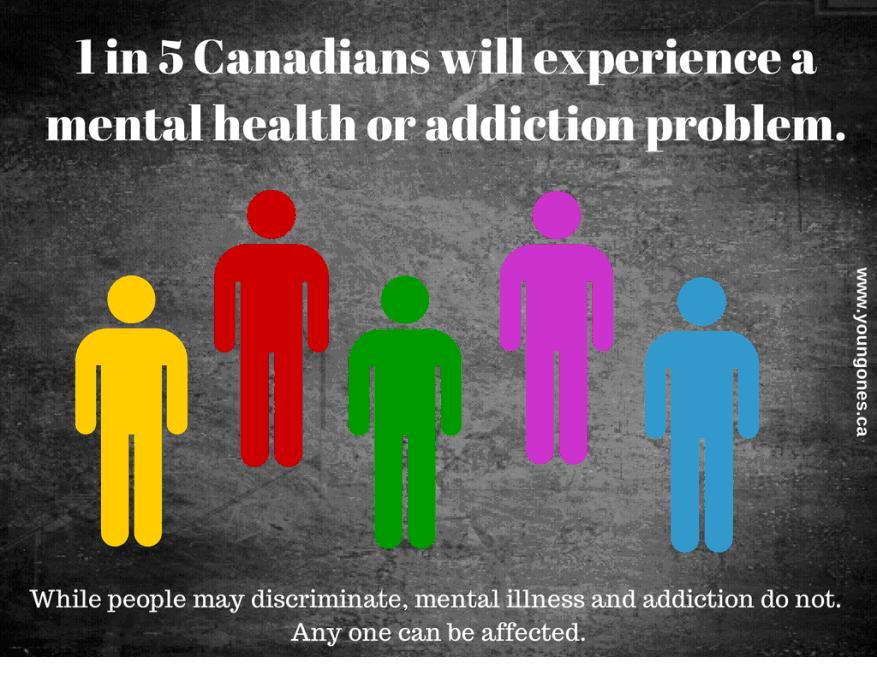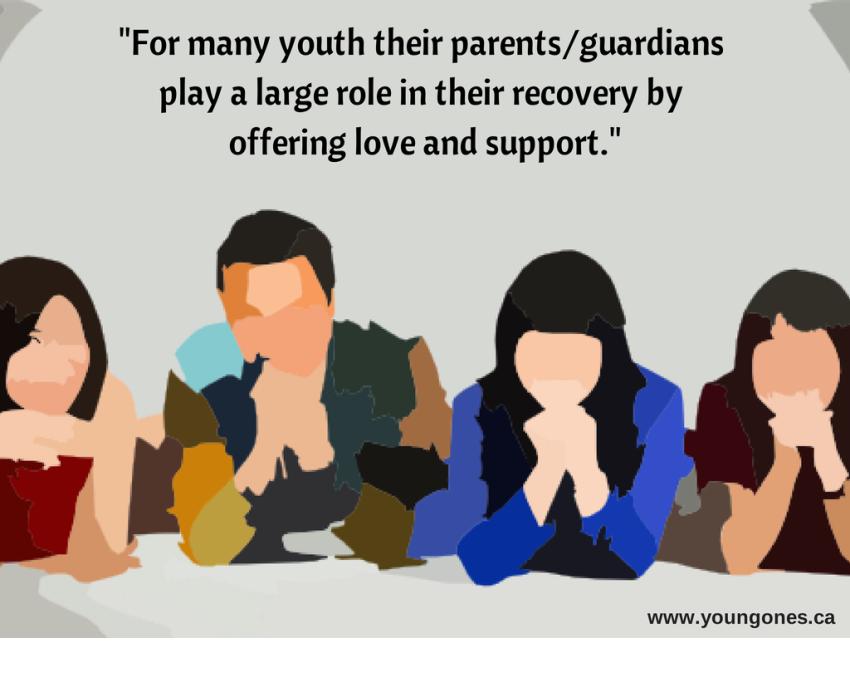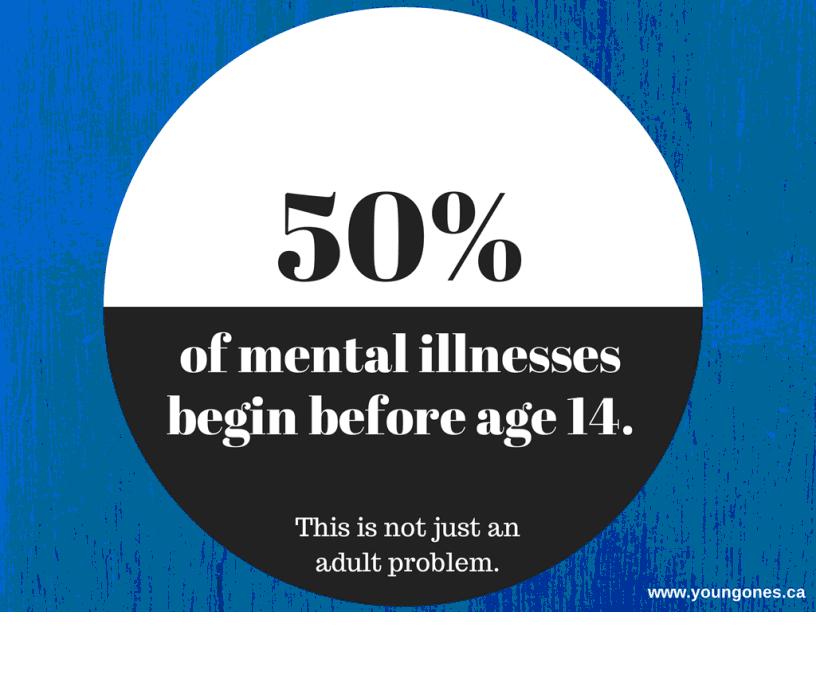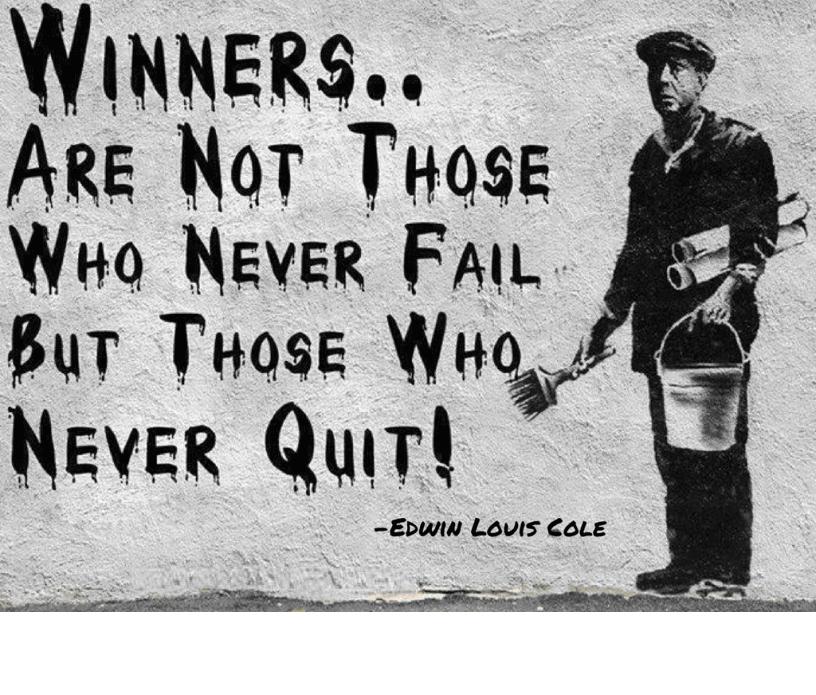Charity Spotlight: This post was provided by Kristen Bellows of Young Ones as part of our ongoing charity spotlight series.
Myth 1: Bad parenting causes mental illness and addiction in youth.
The truth: It’s not that easy to pinpoint what causes youth to develop a mental illness or an addiction. For example, there is a strong link between childhood abuse and youth who develop Borderline Personality Disorder (BPD). Some youth may use drugs and alcohol to cope with abuse they witness at home, leading them to develop an addiction or substance abuse problem. But that is not true for everyone. Genetics, biology, environment and life experiences can influence whether a young person develops a mental illness or addiction. For many youth, their parents and/or guardians can also play a large role in their recovery by offering love and support.
Myth 2: Children and youth can’t have mental illnesses, only adults can.
The truth: Half of all mental illnesses begin before a child reaches age 14, a statistic which spikes to 75 percent before age 24. The reality is, youth aged 15 to 24 are more likely to experience mental health or addiction issues than any other age group. Children and youth may display symptoms differently, but young people can develop mental illnesses the same way adults can as children and youth are exposed to the same biological, genetic, social and environmental factors as adults.
Early intervention is important for children and youth as mental illness may greatly interfere with their developmental needs, resulting in serious long-term effects. Sadly, only 1 in 5 youths will receive the necessary treatment for their mental illness due to limited health services, the perpetuation of this myth, and belief that children will “grow out of it” or that it’s “just a phase”.
“I can vividly remember feeling fat and ashamed of my body in comparison to friends when I was as young as 7 years old…now I’m a now 24 year old and have been struggling with these issues for 13 years.”- M
Myth 3: It is impossible to prevent mental illness.
The truth: The World Health Organization (WHO) has identified both risk and protective factors related to mental illness. Although mental illness can affect anyone regardless of background, some youth are more likely to experience higher instances of mental illness than others due to various risk factors such as childhood poverty. Likewise, early intervention and easier access to affordable mental health treatments can ease symptoms of youth who are already experiencing a mental health disorder. Simply by helping children and youth develop a positive self-identity, self-esteem, and self-regulation, adults can support and prevent potential mental health problems. When youth know they have someone on their side, crises can be less damaging, or simply avoided.
Myth 4: Drug addiction is a choice
The truth: No one ever chooses to become addicted to drugs or alcohol. Youth addicted to drugs and/or alcohol chose to try the substance for various reasons, but prolonged use can alter brain chemistry and cause changes in the body. When this occurs, substance use is not a choice; it becomes a physical and psychological need regardless of the negative impact it has on someone’s daily life. In other circumstances, a young person may have a predisposition to addiction because of a family history.
It is important to note, however, not every youth who uses substances will develop an addiction. Some youth may use substances socially or recreationally and others may begin to experience substance abuse. The difference between the two is the severity of one’s condition. When an individual is addicted to a substance and suffers from withdrawals, it indicates the mind and body has developed a need for the substance beyond the control of the individual. Many youth are afraid to stop using because substance withdrawal can be extreme. For example, seizures can occur when withdrawing from alcohol.
“I didn’t choose to be born susceptible just like someone doesn’t choose to have diabetes or cancer.” -D
Myth 5: Youth with mental illness and/or addictions are weak, have a flawed personality, and are bad people.
The truth: We cannot rely on statistics or research studies to bust this myth. Perceiving another person as weak, flawed, or bad will always be in the eye of the beholder. But each youth possesses different abilities, personalities, experiences, wants and needs – all of which needs to be respected and understood, not negatively lumped together. Youth with mental health and addiction issues face extra challenges and must work towards self-improvement while facing those challenges.
“If I am here today, alive and healthy, then I am strong, not weak, and not defined by my mental health.” –I
Young Ones: Breaking Barriers
Young Ones is dedicated to assisting youth who struggle with mental illness, concurrent disorders, and addictions, in an effort to achieve better mental health. Young Ones also provides support to families, and is breaking barriers to provide enhanced quality care and quality of life.
To carry out our mission, Young Ones provides 10 treatment sessions for youth in financial need. Unlike our treatment program, our Peer Support Program provides youth with the opportunity to receive support from peers who have also lived with mental health and/or addiction issues. And finally, our education program aims to reduce stigma and spread mental health and addiction awareness by speaking to the public. Young Ones has spoken at Ryerson University, various hospitals in Toronto, and COTA Health, Scarborough. Learn more about Young Ones on their charity profile page »




